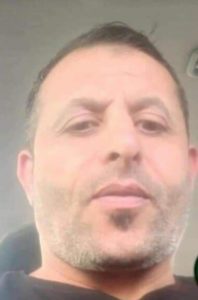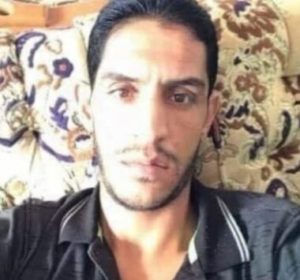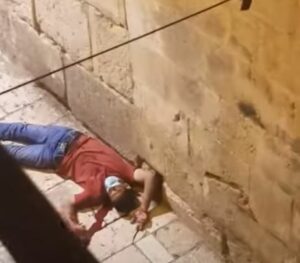 May 30, 2020: Eyad al-Hallaq, 32, an unarmed, autistic Palestinian man was shot and killed by Israeli police in Jerusalem. The police then left him lying on the ground with multiple gunshot wounds for over an hour until he bled to death.
May 30, 2020: Eyad al-Hallaq, 32, an unarmed, autistic Palestinian man was shot and killed by Israeli police in Jerusalem. The police then left him lying on the ground with multiple gunshot wounds for over an hour until he bled to death.
Eyad was killed when the soldiers shot him with eight live rounds at the stairs of the Al-Aqsa Mosque, in occupied Jerusalem, while he was walking to the al-Bakriyyah School for persons with special needs.
The police who killed Hallak claimed that they thought he had a suspicious object in his hand. But Israeli police spokesman Mickey Rosenfeld confirmed to reporters that no weapon was found.
Eyewitnesses said Eyad was just walking when the soldiers started shouting at him, and he got scared by their loud voices and tried to run away.
They added that the soldiers could have easily arrested him, without resorting to the lethal and excessive use of live fire.
 Palestinian President Mahmoud Abbas stated that the killing of Hallaq was “a real crime”, and that “those who committed it must be brought to justice, and be convicted by the International Criminal Court”. He stated that the Israeli Prime Minister Benjamin Netanyahu should be held fully responsible for the killing.
Palestinian President Mahmoud Abbas stated that the killing of Hallaq was “a real crime”, and that “those who committed it must be brought to justice, and be convicted by the International Criminal Court”. He stated that the Israeli Prime Minister Benjamin Netanyahu should be held fully responsible for the killing.
Following the Israeli police shooting, protests erupted in the city of Jerusalem. Israeli police closed all the gates leading into Jerusalem’s old city, banning all entry and exit.
The mother of the Palestinian who was shot and killed by Israeli soldiers in occupied Jerusalem, said that the Israeli allegations and justifications for his brutal murder are mere lies, as the slain man was autistic, and was a child in a man’s body.
The mother was walking aimlessly around her home in Wadi al-Jouz in Jerusalem, looking lost, and unable to grasp the news about the death of her only son.
Minutes after the news about his death started spreading, she was informed that he was alive and was only shot in his leg near Bas al-Asbat in Jerusalem, but shortly afterwards it became clear that he was killed by the soldiers.
 His father, Khairi al-Hallaq, shocked and in disbelief, was sitting in his home, surrounded by several young men who knew the slain Palestinian and rushed to his home, could not utter many words, except prayers and mumblings that only echoed “he was killed in cold blood, he was murdered…”
His father, Khairi al-Hallaq, shocked and in disbelief, was sitting in his home, surrounded by several young men who knew the slain Palestinian and rushed to his home, could not utter many words, except prayers and mumblings that only echoed “he was killed in cold blood, he was murdered…”
His slain autistic son, he said, may have looked like a grown man, but his brain was that of a child, who didn’t interact with anybody, and who only left home to go to the special needs school.
“Why would they kill him in cold blood like this,” he said, “They claim that they thought he carried a weapon! Why didn’t they search him, why did they have to kill him without even making sure he was carrying the claimed weapon”.
He added that his slain son started going to the special needs school around six years ago, and that he goes there every day from the morning until evening, and when he returns home, he just sits alone in his room.
 His weeping mother, distraught and unable to catch a normal breath, said, “Why didn’t they just capture him… why not search him… why did they have to rush to fatal shots, to killing him in a cold-blooded manner like this.”
His weeping mother, distraught and unable to catch a normal breath, said, “Why didn’t they just capture him… why not search him… why did they have to rush to fatal shots, to killing him in a cold-blooded manner like this.”
“He was murdered in cold-blood, he carried nothing but his mobile phone and his wallet”, she added, “He carried no weapons, he wanted to go to school because he felt bored at home, but at school he could be more active, and interact with others….”.
“Right now, after they killed him like this, my only wish is that we can have the burial ceremonies at the Al-Aqsa Mosque, before he is buried in the soil of Jerusalem,” she added, “He was an innocent person, he hated nobody, and what they did to him is a crime not only against him, but also against every person with special needs. They killed my only son, who was a child in a man’s body. They killed my only son, they killed my only son…”
Attorney Eyad al-Qadamani, who is representing the family, said that the Israeli police is investigating the fatal shooting, and so far, the police is not admitting he was killed by mistake, and are unwilling to transfer his corpse back to his family for burial.
The lawyer added that the Israeli police imposed a gag order, forbidding the release of the names of the officers involved in his death, or even any information about the units they belong to.
The imposed gag order will remain in effect until June 3rd and could possibly be extended for a longer period.
Israeli media outlets said the slain young man did not carry any weapon, and that he was shot just because “he failed to stop when was ordered to.”
The police claimed that they noticed he carried a “suspicious object”, and that they though it was a gun, and added that he was ordered to stop, but he started running and a chase ensued.
Israeli daily Haaretz said the Palestinian was unarmed, and that the officer who shot him said “he suspected al-Hallaq was a terrorist because he was wearing gloves.”
Haaretz quoted a statement by the Israeli police claiming that “two officers noticed the Palestinian carrying a suspicious object that they thought was a gun and ordered him to stop. After the man refused and started fleeing the scene, the officers started chasing him on foot and opened fire, ultimately killing him while he was trying to hide behind a dumpster.”
It added that the police then closed on the Old City, and that the Police Internal Investigations Department will be investigating the incident.
Haaretz also said that the two officers who were involved in chasing him and then the fatal shots, were questioned by the police, before one of them was released “under restrictive conditions”, and the second officer was placed under “house arrest.”
The Israeli media agency also quoted source which was described to be “familiar with the investigation”, the junior officer, who was a recruit armed with M16 automatic rifle, is being suspected of “continuing to shoot despite being ordered by his commander to stop.”
Haaretz added that the officer “continued to shoot because he saw al-Hallaq was still moving”, and that a court in Jerusalem issued a gag order preventing the release of the names of the officers involved in the fatal incident.
The police also raided Hallaq’s home in Wad el-Joz and questioned his family. Khairi Hallaq, the father of the deceased, told reporters “They found nothing”, and noting that police had cursed his daughter when she became upset at them.
Rana Hallaq, the mother of the deceased, told Israeli Channel 12 that her son “was killed in cold blood”. On social media, many drew comparisons between the shooting and the ongoing police violence in the U.S.
According to Israeli Channel 12 news, members of Israel’s paramilitary border police fired at Halak’s legs and chased him into a dead-end alley.
The Israeli channel reported that a senior officer ordered a halt in fire as they entered the alley, but that a second officer did not listen and fired six or seven bullets from an M-16 rifle. They claimed that both officers were taken into custody and then released.
Eyad was from Wad al-Joz in East Jerusalem. Source: IMEMC
 September 10, 2021: Dr. Hazem al-Jolani, 50, was killed by Israeli soldiers near Bab al-Majles (The Council Gate) in the Old City of occupied Jerusalem after the army claimed that he “attempted to stab a soldier.”
September 10, 2021: Dr. Hazem al-Jolani, 50, was killed by Israeli soldiers near Bab al-Majles (The Council Gate) in the Old City of occupied Jerusalem after the army claimed that he “attempted to stab a soldier.”
 August 28th, 2021: Ali Burqan, 17, was killed in an accident that took place during a home demolition ordered by Israeli authorities. He was killed when a wall collapsed on him, while he and many residents were helping their neighbors who were forced by Israel to demolish their home in occupied Jerusalem.
August 28th, 2021: Ali Burqan, 17, was killed in an accident that took place during a home demolition ordered by Israeli authorities. He was killed when a wall collapsed on him, while he and many residents were helping their neighbors who were forced by Israel to demolish their home in occupied Jerusalem. It added that dozens of Palestinians were helping the family who was forced to demolish its home under the pretext of not being licensed by the City council in occupied Jerusalem.
It added that dozens of Palestinians were helping the family who was forced to demolish its home under the pretext of not being licensed by the City council in occupied Jerusalem. May 16, 2021: Shaher Abu Khadija, 41, was killed by Israeli soldiers at a military roadblock near Jerusalem, in the West Bank.
May 16, 2021: Shaher Abu Khadija, 41, was killed by Israeli soldiers at a military roadblock near Jerusalem, in the West Bank. April 6th, 2021: Osama Sidqi Mansour, 42, was shot and killed by Israeli soldiers, and his wife was shot in the back and injured, when the soldiers opened fire at their car near the occupied Palestinian capital, Jerusalem, in the West Bank.
April 6th, 2021: Osama Sidqi Mansour, 42, was shot and killed by Israeli soldiers, and his wife was shot in the back and injured, when the soldiers opened fire at their car near the occupied Palestinian capital, Jerusalem, in the West Bank. November 25, 2020: Nour Jamal Shqeir, 37, was killed by Israeli soldiers while driving through the Za’im military roadblock, east of occupied Jerusalem. The army claimed the man tried to ram the soldiers with his vehicle.
November 25, 2020: Nour Jamal Shqeir, 37, was killed by Israeli soldiers while driving through the Za’im military roadblock, east of occupied Jerusalem. The army claimed the man tried to ram the soldiers with his vehicle. August 17, 2020: Ashraf Hasan Atallah Halasa, 30, was killed by Israeli soldiers near Bad Hotta, one of the gates of the al-Aqsa Mosque, in occupied East Jerusalem, reportedly after he attacked officers, wounding one.
August 17, 2020: Ashraf Hasan Atallah Halasa, 30, was killed by Israeli soldiers near Bad Hotta, one of the gates of the al-Aqsa Mosque, in occupied East Jerusalem, reportedly after he attacked officers, wounding one. The Palestinian eventually bled to death after being denied the urgently needed medical treatment, while Israeli medics tended to the wounded officer, 19, who sustained a moderate injury.
The Palestinian eventually bled to death after being denied the urgently needed medical treatment, while Israeli medics tended to the wounded officer, 19, who sustained a moderate injury. May 30, 2020: Eyad al-Hallaq, 32, an unarmed, autistic Palestinian man was shot and killed by Israeli police in Jerusalem. The police then left him lying on the ground with multiple gunshot wounds for over an hour until he bled to death.
May 30, 2020: Eyad al-Hallaq, 32, an unarmed, autistic Palestinian man was shot and killed by Israeli police in Jerusalem. The police then left him lying on the ground with multiple gunshot wounds for over an hour until he bled to death.



 February 22, 2020: Maher Ibrahim Zaatra, 33, was shot and killed by the Israeli police in Bab al-Asbat area in the Old City of occupied Jerusalem.
February 22, 2020: Maher Ibrahim Zaatra, 33, was shot and killed by the Israeli police in Bab al-Asbat area in the Old City of occupied Jerusalem. February 6, 2020: Shadi Bana, 45, a Palestinian citizen of Israel who ran a flower shop in Jerusalem, was shot and killed by Israeli border police in Jerusalem on Thursday. Israeli authorities claimed that the florist was shot because he “had a gun and attempted to fire at police”.
February 6, 2020: Shadi Bana, 45, a Palestinian citizen of Israel who ran a flower shop in Jerusalem, was shot and killed by Israeli border police in Jerusalem on Thursday. Israeli authorities claimed that the florist was shot because he “had a gun and attempted to fire at police”. August 15, 2019: Nassim Abu Roumi, 14, was shot and killed by Israeli police near the al-Aqsa Mosque in Jerusalem after an alleged stabbing of an Israeli police officer that resulted in a light injury.
August 15, 2019: Nassim Abu Roumi, 14, was shot and killed by Israeli police near the al-Aqsa Mosque in Jerusalem after an alleged stabbing of an Israeli police officer that resulted in a light injury.